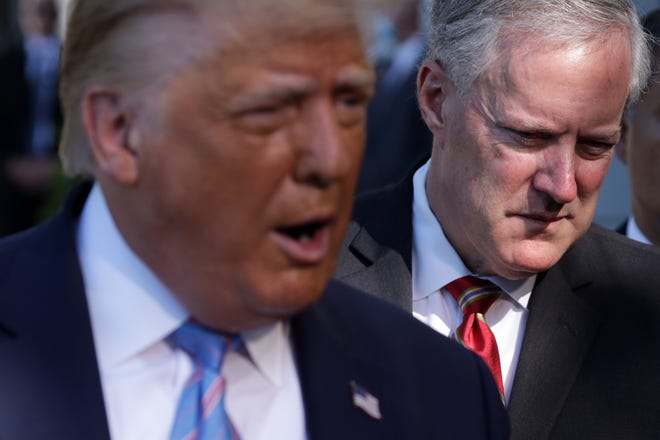Emails: Trump White House pressured Justice Department to back false claims of voter fraud
WASHINGTON – The Trump White House began to privately pressure then-Deputy Attorney General Jeff Rosen to look at baseless allegations of voter fraud just before he was about to step in as acting head of the Justice Department in December — and even after then-Attorney General William Barr had publicly acknowledged the agency had found no evidence of widespread fraud that would’ve changed the results of the election.
A trove of emails released Tuesday by the House Oversight and Reform Committee show a persistent pressure campaign in the days leading up to Jan. 6, when former President Donald Trump’s supporters stormed the U.S. Capitol to keep Congress from counting state-certified Electoral College votes. The emails also show how top Justice Department officials, unconvinced about the merits of the voter fraud allegations, resisted calls from the White House to investigate the claims.
In one Jan. 1 email, White House Chief of Staff Mark Meadows sent Rosen a link to a YouTube video about a debunked theory that votes were switched from Trump to Joe Biden at the U.S. Embassy in Rome. Rosen forwarded the email to then-Acting Deputy Attorney General Richard Donoghue, who called it “pure insanity.”

The email is one of several instances in which Meadows urged the Justice Department to look into voter fraud allegations.
Less than an hour later, Meadows asked Rosen to have a Justice Department official look into signature anomalies in Fulton County, Georgia. That official is then-Assistant Attorney General Jeff Clark, who’s sympathetic to Trump’s effort to overturn election results and whom the president later considered appointing as Rosen’s replacement after Rosen refused to pursue voter fraud claims.
“Can you believe this? I am not going to respond to the message below,” Rosen said as he forwarded Meadows’ email to Donoghue.
“At least it’s better than the last one, but that doesn’t say much,” Donoghue responded.
Rosen also said he was asked to have the FBI work with an associate of Rudy Giuliani, the former president’s personal attorney who was at the forefront of false voter fraud claims.
“I flatly refused, said I would not be giving any special treatment to Giuliani or any of his ‘witnesses,’ and re-affirmed yet again that I will not talk to Giuliani about any of this,” Rosen said in an email to Donoghue.

In another email, Meadows asked Rosen to review allegations of voting irregularities with Dominion machines in New Mexico.
An attempt to ‘corrupt’ Justice Department
The emails were released ahead of a second House Oversight Committee hearing on the deadly assault on the Capitol. During the first hearing in May, Rosen defended the Justice Department’s response to the attack, saying 500 agents and officers were sent to the Capitol to help police.
“These documents show that President Trump tried to corrupt our nation’s chief law enforcement agency in a brazen attempt to overturn an election that he lost,” Rep. Carolyn Maloney, the committee chairwoman and a Democrat from New York, said in a statement.
White House officials began urging Rosen to look into voter fraud claims on Dec. 14, 2020, the same day that Trump announced Barr’s resignation. Barr, whom Trump lauded as “a man of unbelievable credibility and courage,” fell out of the president’s favor after he refused to back claims of widespread voter fraud.
An email from a White House assistant included talking points outlining irregularities in Antrim County, Michigan, which Trump won by a wide margin. The talking points alleged a “cover-up of voting crimes” in the state, where the results should not be certified for Biden.
The documents also show Trump directed allies to persuade Justice Department officials to file a lawsuit to the U.S. Supreme Court seeking to invalidate results in six battleground states that Biden won.
In multiple emails in late December, Kurt Olsen, a private attorney who represented Texas in a similar (and failed) lawsuit, said Trump told him to meet with Rosen to talk about a similar action by the Justice Department.
“The President of the United States has seen this complaint, and he directed me last night to brief AG Rosen in person today to discuss bringing this action,” Olsen wrote to Rosen’s chief of staff, referring to a 54-page draft lawsuit the president wanted the agency to file.
“This is an urgent matter,” Olsen said in another email to then-Acting Solicitor General Jeff Wall.
Rosen’s chief of staff later asked Olsen to provide Supreme Court precedent for the Justice Department’s involvement in an election case. The Justice Department never filed the lawsuit.
The emails also confirm media reports that Trump considered firing Rosen during a White House meeting and replace him Clark. The New York Times, which first reported on the meeting, likened it to an episode of “The Apprentice,” the reality show Trump hosted before he ran for president. Trump ultimately did not fire Rosen.
After the meeting, Patrick Hovakimian, a former Justice Department official, said: “I have only limited visibility into this, but it sounds like Rosen and the cause of justice won.”
“Amazing,” replied John Demers, who resigned Monday as head of the National Security Division.


